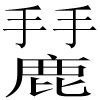The Volokh Conspiracy
Mostly law professors | Sometimes contrarian | Often libertarian | Always independent
It's a Moosical!
Several years ago, I published a book about Thomas Jefferson and the Internet - an exploration, based mostly on Jefferson's own writings, of what I called the "natural history" of the Net, along the lines of Jefferson's own "Notes on the State of Virginia." I used Jefferson's moose - the moose carcass & skeleton that Jefferson, at great trouble and expense, had shipped to him in Paris, where he was serving as Ambassador to the court of Louis XVI, from the woods of New Hampshire - as the organizing metaphor: what was Jefferson trying to accomplish with his moose, and what might that have to do with cyberspace and the search for an understanding of how the Internet works and how it should be governed? Like most authors (especially those who, like me, had invested years of work in the effort), having launched the book (and the metaphor) out into the world, I was hopeful that they would take on a life of their own. You never know what is going to happen - especially these days. Larry Lessig did a fantastic video presentation/re-mix of the book (and the metaphor!), and one reader was inspired to compose a new set of Chinese characters for "moose" (a word that, he said, didn't really exist in Chinese):

But this tops everything: Mario Tosto, Steven Thomas, and my friend and colleague David Johnson, have produced The Moosical: an animated kids' video about Jefferson, the Moose, and the battle for the free and open Internet - complete with a kind of Animal Farm set of characters both adorable and evil ("the Moose that brought the news," the Penguineers, the Commons Sheep, along with the Rooski Mafiooski and the Wise Old Dogs …) battling it out over control of the Net. And all with what are, to my ear, some pretty catchy tunes. It's kind of astonishing, and pretty neat - I won't venture an aesthetic judgment, leaving that to anyone who gives it a listen. But I can see it as an early-Saturday-morning cartoon series (do they still have those anymore?). And who's to say whether things like this don't have more power to get people thinking than weighty scholarly tomes? Bambi, and Smokey the Bear, had a not-insignificant impact on how kids (who eventually become grown-ups) think about our relationship with the natural world - and Animal Farm itself had, to put it very mildly, a great deal to do with the fall of Communism. So a kids' show about keeping the forces of evil away from the Internet so that it remains free and open, that might actually get across the notion that we have to do something in order to preserve and defend this remarkable thing that we tend to take for granted? Not the craziest, and surely not the worst, idea I've heard these days.
[And in case you're wondering - no, I don't get any dough out of this. I was happy to give these guys permission to do what they did, though I'm not sure, in any event, that they needed it. Putting on my copyright lawyer hat, I think there's a very strong argument that even though they may have taken a great deal of substance from my book, what they took are just "ideas" - which are always left unprotected by copyright - ideas that they then expressed in a different way than I had expressed them. Which is precisely what copyright law - when it works - allows (and even encourages) others to do.]


Show Comments (0)